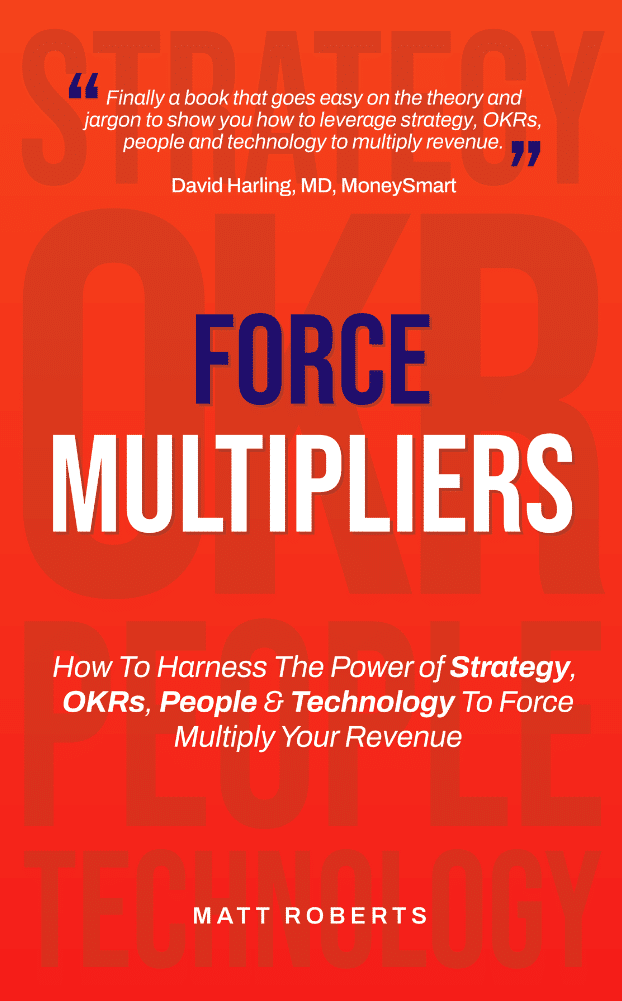Every strategy needs a way of executing it. The OKR framework is a way of doing exactly that if you use this powerful goal setting methodology correctly.
To learn more about OKRs and their potential we recommend you watch the briefing below and read the content that supports it.
Written by Matt Roberts | Co-Founder of ZOKRI
Free Book Download
Force Multipliers
- Pinpoint Customer Value
- Develop Winning Strategy
- Importance Of Keeping Score
- Aligning People & Culture
- Developing OKR Competency
- High Performing Rituals & Habits
"Finally a book that goes easy on the theory and jargon to show you how to leverage strategy, OKRs, people and technology to multiply revenue."
David Harling, MD, MoneySmart
Business Owner & CXO Briefing
The OKR Methodology Explained
This is a 15 minute executive briefing on what is needed to successfully use Objectives & Key Results (OKR) to deliver your strategy, increase performance, & improve culture.
Benefits Of OKRs – Executive Summary
- Business growth relies on our ability to dial-up energy, sharpen focus, and get everyone moving in the same direction. The OKR framework is a proven way to do this.
- OKR adoption will give yoiu the ability to embed a high level goal setting and execution competency across the whole organization – providing direction, purpose and increasing employee impact.
- OKR goal setting processes keep teams focused on the goals that will have the greatest impact and reduce the ‘too many things going on’ challenge.
- You leverage proven performance levers like increasing participation in goal setting, which increases motivation and engagement, and setting stretch targets, which increases goal focus and innovation.
- The time to value of an OKR implementation is low because the process involves discussing possible objectives, measurable outcomes and initiatives from day one, before agreeing on those of greatest value that need to be focused on.
What The Heck Are OKRs (Objectives & Key Results)?
Think of OKRs as rational goal choices that have a logical and motivational narrative. They are constrained by time, and have an inbuilt way of measuring success, and keeping you on track. Matt Roberts, CEO, ZOKRI
- The selection of your objectives will have been informed by strategy, experience, ideas and KPIs.
- There are different types of Key Results that in combination tell stories of what success would look like and your ambition level.
- Some Key Results use KPIs, many don’t so don’t think of OKRs as a replacement for KPIs.
More About Rational Goal Choice
We like to think we are rational and that our teams are also rational. We are not and we’re riddled with biases. Lots of methods have emerged to get us to behave more rationally.
- You’ve got the Eisenhower Matrix where you bucket things into the quadrants based on Importance and Urgency.
- You’ve got Warren Buffett’s 5/25 Method where you list the top 25 initiatives and do the top 5 only.
- You’ve got the ICE method where you list what you could do and evaluate the list based on Impact, Confidence and Effort.
- OKRs when done well borrow from all three. You are trying to set goals for only the most important initiatives and then giving yourself a way of measuring progress.
- OKRs when planned well should be both important and urgent.
- OKRs should be high in impact, you should be confident that they are achievable, if the effort required is aligned with the right resources.
- The same goes for week-to-week execution. If we are to achieve these OKRs, what are our top priorities?
- Building rational priority setting into your company that trickles down from your ideal customer, to your products and the value they offer, to your strategy, OKRs and weekly execution is what we are encouraging.
- It takes time to do well and right but it works.
OKRs Align With Other OKRs
One rabbit hole that’s quickly worth shooting down is that OKRs can have hierarchies, with one supporting another.
- We strongly recommend these hierarchies are shallow, and don’t simply match your org. chart.
- Use OKRs for ‘seriously important goals’ that can unite one or more team behind a common goal and resource them to succeed.
A Valuable Capability Every Company Should Have
A company’s ability to deliver strategic priorities, exploit new opportunities, and solve challenges impacts competitiveness and growth. The Objective and Key Result (OKR) goal setting framework would provide more than a new goal format to use. OKR can:
- Mature strategy delivery capabilities, creating more accountability and transparency.
- Guarantee the right level of thought and consideration goes into how you set goals and plan to achieve them.
- Optimize your human and financial capital / resources.
- Build a high performing culture.
Manager OKR Training
Get The Full OKR Course For Only $79
- Watch full course video
- Download slides for internal presentations
- Download the 46 page OKR handbook and course guide with lots detailed OKR examples that are easy to learn from
- Use the 2 unique downloadable templates to help you write better OKRs
- Get a 30 minute Q & A with the course tutor
- Get life-time access - new assets being uploaded all the time
OKR Tenets – Principles, Beliefs, Philosophies
OKRs are more than a set of Objectives with related Key Results. So what would you be getting yourself into?
- Leadership will provide annual strategic direction.
- Each quarter teams will propose objectives, initiatives and measurable outcomes that will help you achieve your strategic objectives.
- Measurable outcomes are set at a level that stretches teams and it’s clear that success does not require 100% progress to have been achieved. The final success of an objective is considered at the end of the OKR cycle with progress, learnings and other inputs being used to retrospectively decide success levels.
- Through a process of discussion, consensus on which objectives to resource will be reached. Not everything being proposed will be progressed.
- OKR progress will be updated weekly with issues being flagged alongside progress.
- Teams will meet to discuss goal progress and implementation issues weekly.
- The OKR cycle will set the pace, increase urgency and energy by getting people to check-in more, most check-ins happen weekly. Once you set the cadence everybody moves quicker, energy and urgency is noticeable, creating a high energy culture.
- Where possible, teams should be left to work autonomously between meetings to maximize the amount of focused execution time each week.
- An OKR has one owner, however OKR achievement is usually a team effort. The effort starts with the conversations that help propose the OKR and activities that will progress the measurable outcomes (Key Results). As such, tightly coupling OKR ownership to performance reviews is counterproductive as it could encourage undesirable behaviours.
The End Game
It is always useful to know what you’re headed towards then thinking about adopting a framework like OKRs. Here’s a summary of the the end game should look like.
- Leadership has an easy to understand and accessible way to share strategic priorities and track progress, with your strategy being a multiplier on team efforts.
- Teams have a carefully thought out system and process to propose objectives and measurable outcomes that will help move the needle and deliver your strategic aims.
- OKRs have put a stop incrementalism and it’s normal to imagine what a step-change would look like and require.
- The right objectives get the right people with the right amount of resources working towards them and the chances of achieving your objectives is high.
- Teams are not confused over priorities and are not overloaded. Work is focused, outcome driven and rewarding.
- There’s a weekly rhythm cadence is set, and there is an urgency and energy.
- Weekly discussions keep every team execution and outcome focused. Issues are surfaced and solved quickly.
- Autonomy with accountability is designed into how the business prioritizes objectives, with lines of communications and dependencies that create bureaucratic drag, disempowerment and frustration being greatly reduced as a result.
- A culture of trust, transparency, innovation, empowerment and learning is continuously reinforced by the systems and processes being used.
OKR Framework’s Time To Value
There is significant value from the very first conversations teams have around how best to align, maximize impact and value. The full-value is realized as goals progress.
- OKR maturity has occurred when the ways of thinking and working that come with OKR are second nature and explainable by employees across the organization. This milestone is typically reached in 3 to 9 months, but depends on the starting point and level of executive commitment.
- For a typical investment of $150 per employee we see and ROI of between $4,000 and $8,000 per employee, as measured by Revenue Per Employee.
What Does ZOKRI Do?
The training, support and software you need to ignite and sustain growth. Uniting, aligning and galvanizing team around a common winning aspiration and strategy.
- ZOKRI’s training team gives managers and their teams the strategy and goal setting skills and competencies they need to create a winning strategy and define OKRs, KPIs, values and guiding principles that can deliver it.
- Our very cool software then makes the management of your strategy, OKRs, and cultural DNA easy and dramatically reduces execution risk.
OKR Coaching & Workshops
Let Our Strategy & OKR Experts Accelerate Your Learning Curve
Developing your strategy and OKR competencies quickly helps you to improve your business performance.
- Fasted Way To Learn How To Leverage OKRs
- Affordable Investment With High ROI
- Can Include ZOKRI Software
OKR Methodology Perfected In Software
Let Our Software Make Managing Strategy, OKRs & Culture A Breeze
In addition to being a home for your Vision, Mission, Winning Aspiration, Strategy and KPI Scorecards, ZOKRI has class-leading OKR features that ensure the OKR framework is used correctly and drives growth.
-
Strategic Planning Excellence
Strategy, OKRs and KPI Management that works the way you do.
-
People & Cultural Alignment
Define roles, responsibilities and values and recognize alignment
-
Streamlined Updates & Meetings
Check-ins and high-impact meetings made really simple.
Discover An 8 Step Strategic Planning Process That Helps You Ignite & Sustain Business Growth
- Startling Numbers
- Overview Of Each Step
- Preparing To Plan
- Values & Guiding Principles
- Customer Value
- Where Can We Play and Win
- Table Stakes vs Wow Moments
- What Do We Know
- What Is Our Winning Strategy
- Which Goals Do We Need To Commit To Next?
- Having The Right People In The Right Roles
- What Management Systems Are Required
- Launch Your Strategy
- Expert Help & Support
- Forcing The Selection
- Step Change Thinking
- United Kingdom
Ashtead
KT21 1RZ
+44 20 7046 1328

- United States
New York
NY 10013
+1 646-718-4720
- ZOKRI helps leaders and teams achieve strategic goals using the OKR (Objectives & Key Results) framework. Our platform aligns strategy, goals, and people, fostering engagement and growth through comprehensive training and management systems.
© ZOKRI 2025 All rights reserved | Privacy Policy | Terms & Conditions | GDPR
Contacts Us
Tell us what you need. We'd be delighted to help.
"*" indicates required fields
